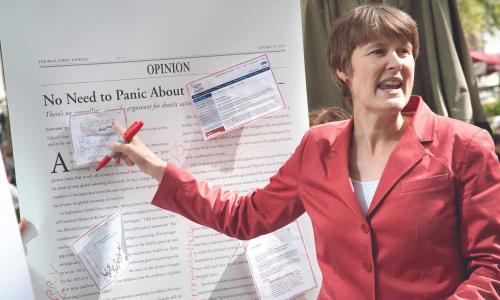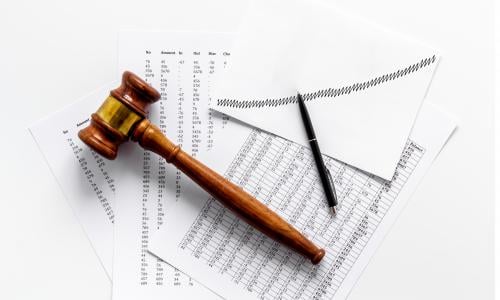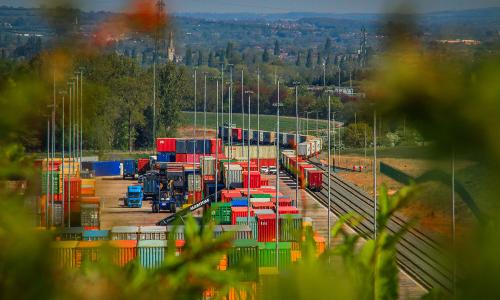Table of Contents
This toolkit explains how scientists can support legal accountability for the fossil fuel industry.
As people, communities, and nations shoulder the mounting costs of climate change caused by fossil fuels, one of the most powerful ways to hold corporations and governments accountable has come through the courts. In the United States, we are seeing a sharp rise in groundbreaking lawsuits against the fossil fuel industry over climate-related fraud or damages, or both. Globally, climate litigation is already having a major impact. A 2022 report by the Intergovernmental Panel on Climate Change (IPCC) identified climate-related litigation as "an important arena for various actors to confront and interact over how climate change should be governed" that "has influenced the outcome and ambition of climate governance."
These cases have a stronger chance to succeed when they are informed by robust and relevant science across a range of disciplines. Science-informed litigation can help those affected by climate change to hold polluters accountable for their damage and disinformation, and to build resilience against future climate impacts.
Scientists have a critical role to play in climate litigation. As experts, we can conduct robust and timely litigation-relevant scientific research, help inform courts via amicus briefs and legal interventions, and appear in court as expert witnesses. The UCS Science Hub for Climate Litigation's goal is to build greater capacity for experts like you to participate in any of these processes.
This toolkit, Research on the Record, explains how you can support legal accountability for the fossil fuel industry.
Why research is crucial to climate litigation
Climate litigation is a growing field in a crucial arena for addressing the climate crisis. When lawmakers block legislation, governments fail to enforce laws, and corporations violate environmental standards, lawsuits can break through to hold polluters and other bad actors accountable in court. Whether it is a suit filed by a small farmer, a storm-damaged municipality, or on behalf of a class of people, plaintiffs depend on scientific evidence to make their case.
Scientists can play a key role in developing and communicating research that is relevant to climate litigation. Courts rely on physical and social science to resolve legal claims about responsibility for carbon emissions and climate change. The opportunities for climate litigation have grown as researchers have provided new evidence on the harmful effects of climate change; the emissions contributions of nations, state-owned and investor-owned corporations; and the fossil fuel industry's decades-long disinformation campaign to denigrate climate science and delay climate action.
Climate litigation-relevant research is a relatively young field. The first study that quantified the effect of human-caused climate change on a discrete weather event was published in 2004 when only 11 climate change-related lawsuits had been filed internationally. Since then, climate litigation has dramatically increased (Fig 1). Between 2015 and 2021, more than 1,000 cases were filed worldwide, which are compiled in the Climate Change Litigation Database.
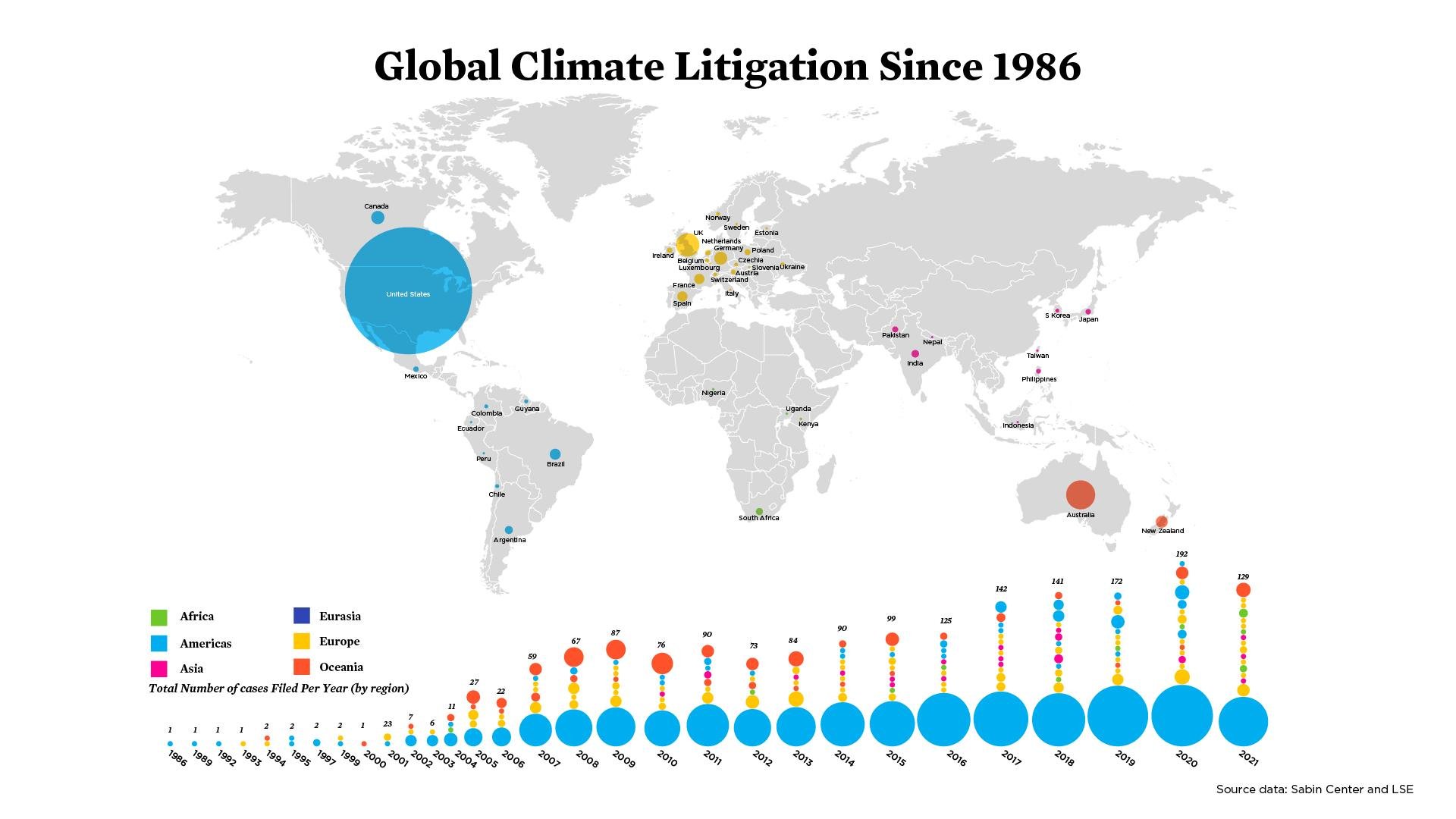
Many climate lawsuits seek damages for communities impacted by climate change, but the importance of this research behind the suits goes beyond final court decisions. Like the US tobacco litigation that culminated in the 1990s, climate litigation could uncover corporate irresponsibility, remedy past harms, and deter future misconduct—and help to strengthen a broader movement working to diminish the fossil fuel industry’s political power.
What kinds of research are most needed?
A peer-reviewed December 2022 article published in a journal of the American Geophysical Union, Research Priorities for Climate Litigation, offers insights by legal and scientific experts on the type of research that could inform climate litigation and help determine government and corporate responsibility for both carbon emissions and climate change-related damages.
A related policy brief published by the Climate Social Science Network lists nearly 100 key questions in the physical and social sciences to meet current climate litigation needs. These research areas include many studies that have been cited by climate damage and deception cases filed around the world.
These articles describe how different types of research dovetail with the legal questions at hand. For example:
- Climate detection and attribution research can play an important role in establishing the causal link between a defendant's contribution to carbon emissions and climate damage (Figure 2).
- Research into the obstruction of climate science and action may help courts determine whether defendants unlawfully impeded responses to climate change through such actions as consumer fraud.
- Courts in many of these cases will have to make decisions about mandating emission reductions by governments or companies. Research on mitigation obligations can help to inform these decisions.
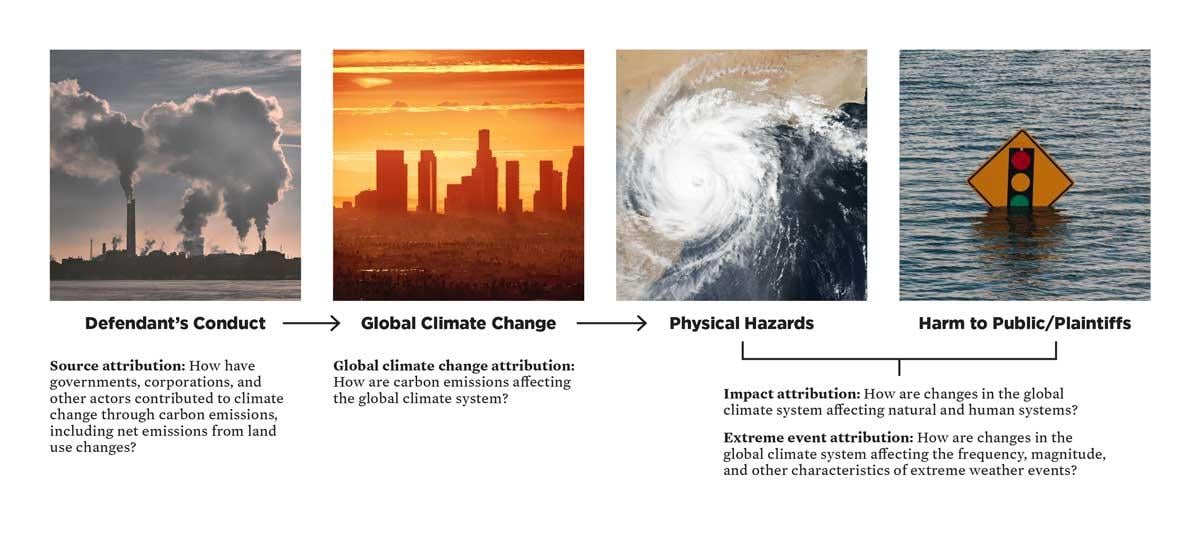
The UCS Science Hub compiles, develops, and communicates new groundbreaking analyses to build stronger cases against fossil fuel polluters, alongside many partners in our community of practice. Below are some linked examples across identified research areas:
- Attribution of localized community impacts to emissions sources and tracing chains of causation between source and impact attribution
- Modeling of compound climate impacts
- Quantification of damages and adaptation costs
- Climate obstruction research including corporate disinformation, greenwashing and fossil fuel financing
- Understanding emission obligations related to fair shares and Nationally Determined Contributions (NDCs), corporate commitments, and treaty obligations
- Modeling decarbonization and the transition away from fossil fuels
- Applying wide-ranging research in novel ways related to health impacts, displacement, cultural heritage, additional losses due to climate damages, etc.
Get involved
Here are some of the ways you can engage—and how the UCS Science Hub can help.
Communicate
Your voice is powerful. Scientists are trusted messengers on issues of public interest. By working with the Science Hub, you will gain skills to communicate science effectively in court and in the court of public opinion. Outside of the courtroom, climate litigation can lead to greater public awareness of climate impacts and the tactics corporations use to block and delay climate action. Normalizing the field of climate litigation-relevant science helps build more support for research and shift practices across academia, state and federal agencies, and industries.
Below are some tools to help you connect your research to climate action.
- Forward Research Priorities for Climate Litigation to your colleagues, share it on social media, and discuss with your colleagues how your research may be relevant to climate litigation.
- Include slides in your next presentation to promote your work as part of the field of climate litigation-relevant research.
- Increase awareness of fossil fuel industry disinformation by highlighting deliberate tactics to manipulate science and obstruct justice.
- Offer your expertise to local policymakers by using the UCS Scientist Advocacy Toolkit.
- Leverage your expertise to amplify new research and provide context for its relevance to climate litigation. Your audience may include judges, prosecutors, and people following litigation in your own community.
Engage
The UCS Science Hub builds skills and provides opportunities to leverage your expertise in legal processes. The Science Hub also offers guidance and support for engagement in navigating the legal process, including greater barriers to participation, risks, or intimidation some researchers face when confronting powerful interests. You can view existing resources for more insight and join the UCS Science Hub to connect with experts and colleagues for direct support to engage in opportunities. Our partners span disciplinary divides, communicate findings to key audiences, and help researchers navigate the risks of engaging in research relevant to corporate accountability and climate law. Consider some of these ways to engage in climate litigation through your research.
- Advise legal teams on climate science or contribute written expertise to litigation through an amicus brief relating climate science to the case at hand.
- Provide expert testimony in court: the Climate Science Legal Defense Fund (CSLDF) provides a guide for scientists to learn What to Expect When Serving as an Expert witness: Risks and How to Avoid Common Pitfalls
- Understand your rights and your digital footprint to be safe and embolden your action: CSLDF Online communications guide
- Sign up for the UCS Science Hub newsletter for updates and new opportunities to engage
Design
Clearly communicated scientific research can strengthen cases with well-defined evidence of attribution and accountability that aligns with the law, or provides critical building blocks to reproduce in further research. As you design new research proposals, consider ways to frame your research that can make it more directly relevant to climate litigation efforts. Connect with the UCS Science Hub for Climate Litigation to confer with a community of practice that can help develop research proposals that address relevant local impacts and redress, and frame research in the context of governmental and corporate obligations in your community. Some key questions to ask include:
- What impacts are affecting communities most and how can you work with communities to shape research?
- How can you build on existing research to quantify attributions to major fossil fuel companies?
- How does your research relate to laws in your state that provide openings or barriers to legal action?
- How can you serve in a peer review capacity to ask litigation-relevant questions for new research that provides clear evidence for legal citations?
By joining the UCS Science Hub for Climate Litigation, you will be joining other scientists, experts, and practitioners who want to strengthen climate cases and maximize the real-world efficacy of their research.
Courts and legal practitioners are generally not trained to evaluate relevant scientific literature or identify relevant experts for advisory roles. Scientists, in turn, may not know how their research could feed into climate litigation or where there are opportunities to communicate their research. The Science Hub works to bridge these gaps.
Sign up to share your expertise and perspective as part of the UCS Science Hub for Climate Litigation. By signing up, you will have access to trainings, a community that includes scientists and attorneys, and the Science Hub newsletter and resources: act.ucsusa.org/ScienceHub or reach out to [email protected].
